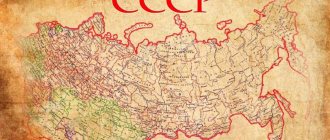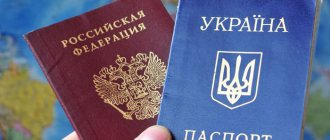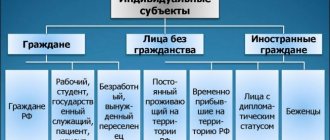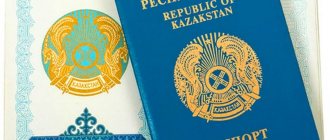Not to be confused with transfer
A separate case of granting citizenship to a group of people is transfer - the transition of the population of a territory from one citizenship to another in connection with the transfer of the territory in which they live from one state to another. Automatic transfer may raise objections among some of the population. Here the option procedure will come to their aid, which corrects the choice of citizenship by persons interested in this. In other words, an option is an independently made decision to choose citizenship in certain circumstances and under specific conditions.
Choosing one, giving up the other
The option as a form of acquiring citizenship in our country must comply with the legislation of the Russian Federation. In any case, it involves choosing one citizenship and refusing the second. It all depends on the right granted to the person to choose the country where she wants to live and work legally. The option is also based on international treaties and agreements, on the international legal agreement of states.
The law on citizenship of our country provides for an option when changing the State border of the Russian Federation. If the territory became part of the Russian Federation, then, as a general rule, persons acquire Russian citizenship without an application by obtaining a document confirming Russian citizenship. If a person is interested in acquiring citizenship of another country, then he applies to government authorities with an application to terminate Russian citizenship.
Other ways to acquire citizenship
Let's say a little about other methods of obtaining citizenship, which are indicated in Art. 11 of the Federal Law "":
- Birth from Russian citizens. If both parents have Russian passports, then the child will be associated with Russia, regardless of the place where he is born. If one of the parents has a Russian passport and the other is a foreigner, then the parents, as a rule, by mutual agreement, choose the child’s citizenship.
- Birth on the territory of Russia. Most Russians receive Russian citizenship automatically precisely on the basis that they were born and live on the territory of the Russian Federation. In addition, this practice is widespread in most countries of the world, and it is actively used by migrants, who often come to the Russian Federation with the aim of having a child in order to ensure that in the future they receive a Russian passport.
- Restoration of citizenship. Applies to those who already had a Russian passport, but for some reason the connection with the state was terminated.
- Acceptance of a foreigner into Russian citizenship. Occurs after the person has fulfilled the legal requirements to receive it. In addition, this method can be used as a basis for acquiring citizenship when state borders change. Thus, in Russia there is a simplified procedure for granting citizenship to those who were born in the republics of the former USSR and have not changed their Soviet passport.
Details can be found in the article: “Grounds for obtaining citizenship.”
Who does the option apply to?
You can choose citizenship if:
- A new state emerged after separating from another;
- part of the state passed to another;
- part of the state separates and becomes independent;
- The country disintegrated into several new states.
Important! If you live in such a state, then the option is your chance to obtain citizenship of the country that you choose yourself. A certain amount of time is given for this.
Option
In case of territorial changes, the right of option arises in the following cases:
* the emergence of a new state by separating it from another state;
* disintegration of one state into several new states;
transfer of part of the territory of one state in accordance with an international treaty under the sovereignty of another state. Persons who are granted the right of option must, within a predetermined period, make a choice: either retain the citizenship of the state in which they previously resided; or obtain citizenship of the state to which the territory actually goes. Children, as a rule, follow the citizenship of their parents upon option. Also, during the option, persons retain their property rights.
An example of an option associated with territorial changes after World War II is the Peace Treaty with Italy of 1947, according to which citizens permanently residing in territories transferred to other states before 1946 were given the right to opt for citizenship for 1 year.
The USSR also concluded a number of option agreements in the post-war period. For example, the Protocol of Options to the 1945 Treaty between the USSR and Czechoslovakia on Transcarpathian Ukraine provided that persons of Ukrainian and Russian nationalities living on the territory of Czechoslovakia (in the regions of Slovakia), and persons of Slovak and Czech nationalities living on the territory of Transcarpathian Ukraine, could choose citizenship of the USSR or Czechoslovakia. An agreement was also concluded on the exchange of populations between Poland and the USSR: persons of Polish and Jewish nationalities living in the USSR received the right to leave for Poland, and persons of Russian, Ukrainian, Belarusian, Ruthenian and Lithuanian nationalities living in Poland had the right to leave Polish citizenship and move to the territory of the USSR.
In international law, a practice has developed according to which, when sovereignty over a certain part of a territory passes from one state to another, the population living in this territory should automatically be granted citizenship of the state that received the specified territory in order to prevent a situation of statelessness affected by such territorial changes, persons. According to activists of the “Russian World”, when the Baltic states left the USSR, the right of option of the Russian-speaking population in these countries was violated, as a result of which a category of population appeared with the so-called status of “non-citizens”, that is, persons actually deprived of a number of civil rights.
In 2014, in connection with the annexation of Crimea to Russia, the population living in the territories of Crimea and Sevastopol received the right to choose: to acquire Russian citizenship or remain citizens of Ukraine.
How does voluntary option work?
If the above territorial changes have occurred in the state, then the option procedure is carried out in the following way:
- the citizen determines whether he meets the criteria for taking this action;
- finds out the deadline within which you need to provide information about your decision;
- submits an application to the migration authorities about the desire to obtain a new citizenship.
If a person does not follow these rules, then he automatically remains a citizen of the state in which he currently resides.
Application in the legislation of the Russian Federation
The application of the concept begins if a territory, for some reason, decides to secede from the state it was a part of. The choice is given to the people living within its borders. Moreover, the corresponding decision must be made within a limited period. When the period ends, the corresponding status will be assigned automatically. This is possible if secession from the Russian Federation or inclusion into it has been completed.
When a territory joins Russia, its residents have the right to receive appropriate citizenship. The procedure is performed automatically. The passport needs to be renewed. To do this, you need to contact the migration service. You will need to fill out an application and required documentation. Most often, it is enough to provide only an old passport, which contains the appropriate registration.
The persons in the above example have the right to refuse to be assigned a new status. In this case, you will also need to submit an application. The action must be completed within the specified time frame. The ongoing adjustments will not affect the rights to property. When a person has decided to leave the citizenship that he previously had, he will be able to live in Russia as a foreign resident.
Examples in other countries
When exploring other countries, you may encounter the return of Hong Kong to China. The procedure took place in 1997. A large number of people were faced with the right to choose.
The possibility of having a second citizenship is enshrined in the legislation of a number of states that are part of the EU. However, there are a large number of caveats. A similar opportunity may be provided through marriage. The rule applies in Denmark and Germany. However, Europe was faced with the problem of mass emigration. As a result, government representatives are forced to change legislation, limiting the possibility of dual citizenship. As a result, people must make choices.
How do rights change during an option?
The citizenship of which state the person chooses upon option will be subject to that law subsequently. Consequently, the rights of the chosen state will also be its rights. If a person remains a citizen of the previous state, then he continues to live in the usual legal regime. If he decides to obtain citizenship of another country, he must be prepared to obey the laws of another state. Before making a decision, it is advisable to familiarize yourself with the legal and legislative framework of the country whose citizenship is preferable.
Practical examples
Konstantin: There are many such examples of options in our history. Let’s take the example of 1991, when all citizens of the USSR, after its collapse, became citizens of Russia, Georgia, Ukraine... There was no need to even change their passport. The same thing happened with the GDR and West Germany, the Czech Republic and Slovakia. There was no need to even change passports.
Ekaterina: Relations between countries and their agreements play a big role in the option. I had dual citizenship - the Russian Federation and Turkmenistan, secured by an agreement between the states. However, it was later terminated. I was forced to choose one citizenship. Moreover, Turkmenistan gave bipatrids a period of reflection of only 2 months.
Question answer
Lydia: I still don’t understand - what is the difference between option and restoration of citizenship?
Tatyana Kuzmina, lawyer: Restoration and option are two different things. The category of those undergoing the procedure for restoration of citizenship includes:
- Parents who renounced citizenship, but after a while requested citizenship for themselves and their child;
- Children with one citizenship who fall under the guardianship of persons with another.
Reinstatement occurs only after confirmation of the presence of official legal work and permanent residence, as well as the absence of offenses.
Common Mistakes
Tatyana Kuzmina, lawyer: Residents of Crimea often apply for Russian citizenship. Since there is no agreement on dual citizenship between Russia and Ukraine, all residents of Crimea currently living there are recognized as citizens of the Russian Federation. Anyone who wants to obtain another citizenship will be forced to go through the procedures for obtaining a temporary residence permit or residence permit while living in Crimea.
It is also mistakenly believed that it is impossible to renounce the citizenship of a particular country. This right is enshrined in legislation and the Constitution of the Russian Federation. To renounce citizenship, you must:
- Write a petition.
- Indicate the reason (one of the parents, spouse or child has another citizenship, the person left for permanent residence in another state).
But it must be borne in mind that the application can be canceled if:
- the person has obligations to citizens of the Russian Federation;
- the person has obligations to the state;
- the person is called up for compulsory military service;
- the person has been recognized as a defendant in criminal cases.
The meaning of the word "option"
In case of territorial changes, the right of option arises in the following cases:
the emergence of a new state by separating it from another state;
the disintegration of one state into several new states;
transfer of part of the territory of one state in accordance with an international treaty under the sovereignty of another state.
Persons who are granted the right of option must, within a predetermined period, make a choice: either retain the citizenship of the state in which they previously resided; or obtain citizenship of the state to which the territory actually goes. Children, as a rule, follow the citizenship of their parents upon option. Also, during the option, persons retain their property rights.
An example of an option associated with territorial changes after World War II is the Peace Treaty with Italy of 1947, according to which citizens permanently residing in territories transferred to other states before 1946 were given the right to opt for citizenship for 1 year.
The USSR also concluded a number of option agreements in the post-war period. For example, the Protocol of Options to the 1945 Treaty between the USSR and Czechoslovakia on Transcarpathian Ukraine provided that persons of Ukrainian and Russian nationalities living on the territory of Czechoslovakia (in the regions of Slovakia), and persons of Slovak and Czech nationalities living on the territory of Transcarpathian Ukraine, could choose citizenship of the USSR or Czechoslovakia. An agreement was also concluded on the exchange of populations between Poland and the USSR: persons of Polish and Jewish nationalities living in the USSR received the right to leave for Poland, and persons of Russian, Ukrainian, Belarusian, Ruthenian and Lithuanian nationalities living in Poland had the right to leave Polish citizenship and move to the territory of the USSR.
In international law, a practice has developed according to which, when sovereignty over a certain part of a territory passes from one state to another, the population living in this territory should automatically be granted citizenship of the state that received the specified territory in order to prevent a situation of statelessness affected by such territorial changes, persons. It is worth noting that, for example, when the Baltic states left the USSR, the right of option of the Russian-speaking population in these countries was violated, and as a result of this, a population appeared with the so-called status of “non-citizens,” that is, persons actually deprived of basic civil rights.
In 2014, in connection with the annexation of Crimea to Russia, the population living in the territories of Crimea and Sevastopol received the right to choose: to acquire Russian citizenship or remain citizens of Ukraine.
Expert opinion and recommendation
Tatyana Kuzmina, lawyer: The option does not require additional collection of documents or visits to migration services if a person who finds himself in certain conditions of the collapse of a country or the transition of a country to another state agrees with the citizenship that applies to the newly created state where he lives. If he is against it, then he must declare this in writing within the prescribed period. If the deadlines are missed, the process will become much more complicated or impossible, depending on the legislative framework of the state.
In accordance with Article 21 of the Federal Law of May 31, 2002 N 62-FZ “On Citizenship of the Russian Federation”, each person can have more than one citizenship, depending on the legal regulation between countries.
in particular, the comments to the article say: “If an international treaty defining the procedure and conditions for the option of citizenship establishes a requirement for the need to terminate citizenship of the Russian Federation in connection with the choice of citizenship of another state, the decision on this is made by the citizen independently. In the absence of such a requirement in an international treaty, a citizen of the Russian Federation may be given the right to retain Russian citizenship and at the same time acquire citizenship of another state, i.e. depending on the legal regulation, have dual or multiple citizenship.” Rate the quality of the article. We want to be better for you:
What is an option?
Important! Please keep in mind that:
- Each case is unique and individual.
- A thorough study of the issue does not always guarantee a positive outcome. It depends on many factors.
To get the most detailed advice on your issue, you just need to choose any of the options offered:
- Use the online chat in the lower corner of the screen.
- Call: Federal number: +7 (800) 511-86-74
The option of citizenship is a choice that a citizen who has received the corresponding status in several states is forced to face. Most often, this concept is used in international legislation. A choice must also be faced in a situation where the territories of one state are transferred to the benefit of another. There is a whole list of people who were forced to face the option. This:
- Citizens who lived in the territory of a country that collapsed.
- People who lived in a subject that decided to stand out and gain independence.
- Persons who have multiple citizenship. A choice must be made if the relevant agreement ceases to be in force between states. An example is the termination of the agreement regulating the possibility of dual citizenship among residents of Turkmenistan and the Russian Federation.
- Citizens who lived in an entity that decided to secede from the state and join another country.
The above examples are related to political events that are limited in time. All this leads to the fact that the option itself has a certain time frame. This means that a person must make a choice within a certain period. To communicate the decision to the authorized body, you must submit an application.
Note! The concept of transfer is highlighted separately. This is the name given to changes in the corresponding status without giving the citizen the right to choose. In modern international law, such a procedure does not apply.
Many terms cause confusion among ordinary people. As a result, people who are not familiar with the specifics of civil law begin to get confused. It is often believed that option and restoration of citizenship are identical concepts. However, this is fundamentally wrong. There are fundamental legal differences.
Citizenship can be restored to a person who once had it. To understand the features of the procedure, it is better to study an example. The last century saw the collapse of the Soviet Union. Let’s say the child’s parents lived on the territory of Kazakhstan and at the time of the action decided to remain citizens of the above-mentioned state. When a minor reaches the appropriate age, he can apply for a Russian passport. In this situation, a recovery procedure is performed. The option involves acquiring the corresponding status in another state.
There is a separate concept of naturalization. It is also different from the above procedure. A similar term is used if a person claims to obtain the corresponding status when purchasing real estate.
This is interesting! The term filiation is sometimes used. It applies if a person acquires citizenship by birthright.
The concept is also applied in other areas. Let’s say that amorphous option is a period of personality formation, when a child develops inclinations and interests. There is also a professional option. This is the name given to the stage of formation of a citizen’s labor intentions, depending on his ideas about work.








